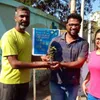Meet the man who went from working at railway stalls to building a community platform for NGOs and changemakers
Manoj Pachauri started Noida-based Socio Story as a community platform for people, stories, and ideas that create a social impact. The organisation helps NGOs and individuals work on their ideas and scale their plans.
At age 14, most teens are pondering over what game or activity they should focus on. But Manoj Pachauri was selling top-up cards to earn a living, support his family, and fund his education. Hailing from a small village, Pohina in Aligarh district, Manoj had a rough childhood. All he wanted was to help his family and complete his education. Speaking in English seemed like an impossible dream.
“Forget English, there was a time when I couldn’t even think that I would able to speak Hindi,” says Manoj, now 27 years old.
He’s come a long way since then. In 2018, Manoj founded Socio Story, a social community platform that provides a voice and platform to people, stories, and ideas that create a social impact.

Manoj Pachauri (left) helps changemakers to bridge the gap between knowledge and skills in social sector enterprises.
Apart from revealing the journey of social workers and NGOs across the globe working to make the world a better place, the platform connects them with experts and other social impact makers to execute their ideas.
So far, Socio Story has mentored over eight NGOs and has impacted more than 1,000 lives. At present, the organisation is mentoring Aaroogya, a door-to-door healthcare facility that has helped 5,00,000 women across the Delhi-NCR region, Haryana, West Bengal, and North Eastern states.
The beginning
However, it wasn’t easy for Manoj who doesn’t have a strong financial background. “It was very tough for me and my family. My father used to work as a farmer and labourer. My mother also used to work every day just to make sure there was food on my plate,” he says.
When Manoj turned 14 years old and came to Class IX, he decided to take matters into his own hands. He would travel to a nearby city to purchase top-up cards worth Rs 5 and Rs 10, which he would bring back to his village and sell for Rs 6 and Rs 11. This helped him earn about Rs 5,000 a month, which helped him fund his education and support his family.

Dimple Parman Founder, Love Heals
He cleared his State board exams, and, in 2008, enrolled in a nearby college, Mangalayatan University, Aligarh, for a bachelor’s in business administration course. The semester fee was the next big obstacle.
“My parents used to borrow money from lenders and relatives to pay my semester fees. The money would be returned; my parents would work on farms for months for this. It wasn’t a smooth transition until I graduated, and I used to stay at my uncle’s house.”
After graduation, in 2011, Manoj began looking for a job, and went to over 25 companies for interviews, but luck didn’t seem to favour him. After a few struggles, he went to Noida and took up a job as a field boy, earning a meagre Rs 2,000 per month.
This wasn’t something Manoj wanted to do. “I was at the railway station and had no money with me. So, I worked for stall owners, delivering items to fill their stock, and would get some commission. After a few days, when I had some money, I made up my mind to pursue an MBA to earn a better living and support my family,” he recalls.
Turning things around
This time, Manoj had to arrange money for the college fees himself, so he approached a couple of banks.
“The manager didn’t approve in the beginning, but seeing me consistently coming to the bank for a month, he went ahead and approved my education loan for which I submitted my family’s land as collateral,” he says.
After completing his MBA course in 2014, he got a job through campus placement. The job in the sales and marketing sector gave him a decent earning, but Manoj was not satisfied. He changed a couple of jobs and ended up moving to Delhi in 2016.

Manoj Pachauri offers instructor-led workshops and webinars that enhance capabilities in the social sector.
His jobs and experience led him to realise that many people want to do good and give back to society. Unfortunately, with no resources and support, many individuals and NGOs couldn’t execute their ideas or scale up operations.
He says, “Whenever I used to go back to my village, I saw many young people who have the passion but no means to support. Even basic education wasn’t feasible as their parents were struggling to get one meal in a day.”
A helping hand
Manoj observed that people working in the sector of organic farming and other sustainable projects needed to be helped. In 2017, he started organising events in Noida, where people who were doing good for society would come on stage and share their stories. This was done alongside his job, and he would also organise small-scale events for local NGOs and individuals.
“It was informal. I didn’t have any idea on how to structure it. Things started in 2018 when I learnt how to execute my idea and give it a shape,” he says.
Manoj organised seven to eight events in a row, and with the contacts he had in the industry, he started calling CSR heads. And that led to the birth of Socio Story.
The NGOs that participated through Socio Story’s online platform include Clownselors, Aaroogya, Love Heals, and others.
Manoj soon left his job and decided to build Socio Story.
“We provide early-stage assistance to NGOs, in terms of getting CSRs projects, or building their websites or some legal assistance at a nominal fee,” he says.
Socio Story also has a vertical called SocioStory Academy, where Manoj helps changemakers to bridge the gap between knowledge and skills in social sector enterprises and succeed. He offers instructor-led workshops and webinars that enhance capabilities in the social sector. All these activities are funded through sponsorships.
To share a story on Socio Story, you have to get a nomination. Around 500 nominations are received every quarter, and are reviewed by an expert panel, comprising members from Ashoka University, TEDx speakers, community leaders, and many more.
After review, five contestants are selected to share their stories. The winner gets an opportunity to pitch his or her idea and interact with CSR leaders.
Till now, Socio Story claims to have told 2,400 stories, and helped execute five ideas.
The path ahead
Manoj is now keen to build an investor’s panel, and aims to get NGOs from across India and groom them to get funding or alternate support to scale their operations.
He also wants to uncover the stories of the many unsung heroes who are doing good for society across the world. Manoj aims to give them adequate support, by helping them build an impact venture and getting them right investors and media exposure.
(Edited by Teja Lele Desai)








